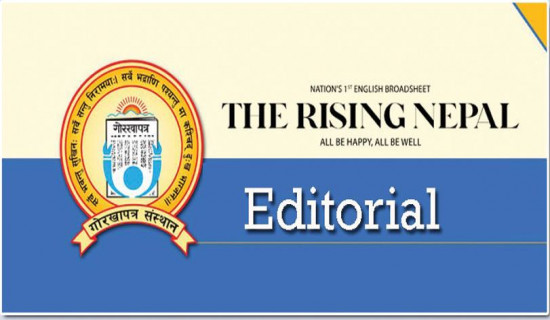- Friday, 23 January 2026
Sound Credit Rating
Nepal has secured a BB- score with stable outlook in its first-ever sovereign credit rating. The rating process, conducted by Fitch Ratings Ltd., involved a comprehensive evaluation of the country's economic structure, public finance, debt sustainability, and medium-to-long-term growth plans, as laid out in Nepal's 16th Five-Year Plan which came into force in the current fiscal year (FY) 2024/25. Among South Asian countries, only India's score is higher than Nepal's. It is a significant milestone highlighting the nation's economic structure, fiscal management, and macroeconomic stability, according to the Ministry of Finance (MoF). Normally, countries with score above BB- are considered conducive for investment, while ratings below this is taken as risky with potential insolvency.
The ratings reflect Nepal's low and highly concessional government and external debt burdens, strong external liquidity and solid growth prospects underpinned by promising hydropower sector and strong foreign currency reserves. These strengths are decisive to offset the shocks the economy might have to endure as a result of it being loosely linked with the global economy and its intricate systems. The rating agency has also said that the GDP per capita and governance metrics are well below the 'BB' median, but have been improving since the end of armed conflict in 2006 and the subsequent political transition. It also signals a brightening economic outlook and revitalised economic activity, which are expected to contribute to positive economic growth in the country.
Ratings are determined using a combination of sovereign rating models and qualitative analysis, with scores ranging from a minimum of 'D' (default risk) to a maximum of 'AAA' (high credit quality). The achievement spotlights Nepal's creditworthiness, robust financial and economic capacity, and its ability to secure international loans at lower interest rates. The rating is also expected to enhance private sector confidence and attract foreign investments. Sovereign credit ratings assess a country's economic health across four key dimensions: structural features, macroeconomic performance, public finance, and external finance.
A country's credit rating is based on a number of factors, including its economy, debt structure, and government's ability to manage its finances. Credit ratings help lenders and investors decide whether to extend credit or loans, and at what terms. Lenders consider borrowers with higher credit ratings to be less risky, so they can offer lower interest rates. High credit ratings can attract investors, which can lead to better access to capital and lower costs.
What's more, this rating also serves as a significant step in the country's march towards its graduation by 2026 from the Least Development Country (LDC) status. It is expected to give a much-needed fillip to foreign investors' confidence, leading to increased investments in critical sectors such as infrastructure, tourism, agriculture and services, and driving transformative growth in the coming years. It could also position Nepal as a competitive player in the global economy.
Given that the rating is periodic and could well change next time, it's incumbent upon the government to strive to at least maintain the score, if not upgrade it. For this, it needs to ensure policy stability and political stability. More importantly, if we are to enhance the country's appeal as a low-risk country in terms of investment, giving a facelift to crumbling infrastructure as well as building many new ones that not only ease the process of doing business here but are also sustainable is the need of the hour.

















